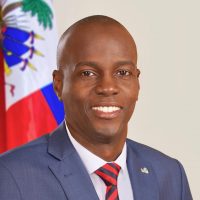Jovenel Moise

Jovenel Moïse (born 26 June 1968) is a Haitian politician serving as the 42nd and current President of Haiti since February 2017. Previously, final official results had shown him as the winner of the November 2016 election.
Jovenel Moïse was born to a middle-class family in Trou-du-Nord, Nord-Est. He is the son of Etienne Moïse, a merchant, and Lucia Bruno, a seamstress.
In July 1974, his family moved to Port-au-Prince, where he attended the Don Durélin National School, the Lycée Toussaint Louverture, and the Cultural Center of the Collège Canado-Haïtien. He studied political science at Université Quisqueya and married Martine Marie Etienne Joseph, a classmate, in 1996. That year, he left the capital and moved to Port-de-Paix with the goal of developing rural areas.
Business career: With little investment capital, Moïse created his first business in Port-de-Paix: JOMAR Auto Parts, still in operation today.
Shortly after, he began a project to provide clean water to rural areas. In 2001, he partnered with Culligan, a company based in Port-au-Prince. With loans from financial institutions and individuals, he opened a water plant serving the departments of Nord-Ouest and Nord-Est.
In 2004, Moïse became a member of the Chamber of Commerce and Industry of the Northwest (CCINO). Soon after, he was elected president of CCINO. He later became secretary general of the Chamber of Commerce and Industry of Haiti (CCIH), where he helped increase the representation of the regional Chambers of Commerce within the national organization.
In 2008, he helped found the Haitian Energy Company SA, which aims to bring solar and wind power to 10 communes in Nord-Ouest.
In 2012, in Trou-du-Nord, he founded Agritrans SA and helped create Haiti’s first agricultural free trade zone, a banana plantation spread out on nearly 1,000 hectares of land in Nord-Est. This led to more than a dozen agricultural projects that created almost 3,000 direct jobs and 10,000 indirect jobs.
Political career: In 2015, President Michel Martelly designated Moïse as the presidential candidate of the political party Martelly founded, the Haitian Tèt Kale Party (PHTK).
In his campaign, Moïse promoted bio-ecological agriculture as an economic engine for Haiti, whose population is over 50% rural. He also expressed support for policies pursued by Martelly: universal education and health care, energy reform, rule of law, the creation of sustainable jobs, environmental protection, and development of Haiti as a destination for ecotourism and agritourism.
Moïse received 32.8% of votes in the first round of the 2015 elections held on 15 October 2015, qualifying for a runoff with the second-place finisher, Jude Célestin. However, an exit poll conducted by the Haiti Sentinel showed Moïse receiving only 6% of the vote, and many observers called the results fraudulent. Thousands of people took to the streets in violent protest, forcing the postponement of the runoff election.
On 27 November 2016, election officials said Moïse had won the 2016 election in the first round based on preliminary results, with an estimated voter turnout of 21%.

